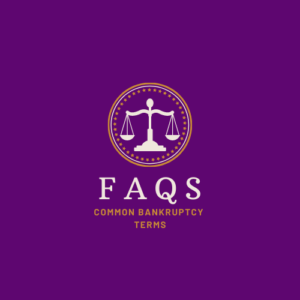Common Bankruptcy Terms

If you’ve decided to look into bankruptcy, or have already consulted a lawyer and are in the process of filing, you may be overwhelmed with the legal terminology. Your lawyer will answer your questions along the way and keep you informed on the status of your case, but if you’d like a quick primer on some common terms we’ve included a list of the ten most common bankruptcy terms you’re likely to hear during your case:
- Automatic stay: after a debtor has filed a case, creditors must stop all collection efforts for a period of time unless they get permission to continue. This protection is referred to as the “automatic stay.”
- Credit counseling course: courses required by the court that debtors must complete and finalize before bankruptcy.
- Creditor: a party to whom a person or persons owes a debt. A creditor could be a credit card company, a hospital or doctor’s office, or even the IRS.
- Debtor: a person (or persons) who files for bankruptcy.
- Discharge of debtor: a court decree that says a person (or persons) no longer owes money for the debts listed in your bankruptcy petition.
- Dismissal: a court can order dismissal of a bankruptcy case if a debtor fails to pay the filing fee, fails to take credit counseling courses, fails to attend your meetings of creditors, or fails to provide required information to the trustee.
- Petition: the document filed that begins the bankruptcy case in the court system.
- Secured debt: money owed on an item that is held by collateral. Examples include home mortgages and auto loans.
- Trustee: a person appointed by the court who reviews a bankruptcy case. The trustee acts as a case manager to review finances, assets and conduct meetings of creditors.
- Unsecured debt: money owed on credit card bills, student loans, medical bills, or other debt not secured by collateral.
If you have questions on the bankruptcy process are wondering if filing may be the best fit for you, please contact us today. MDRF is a charity and we offer 100% free consultations to every Massachusetts resident who requests one. We also offer representation if appropriate, and if the individual qualifies under our eligibility guidelines.